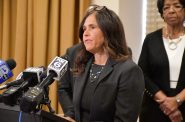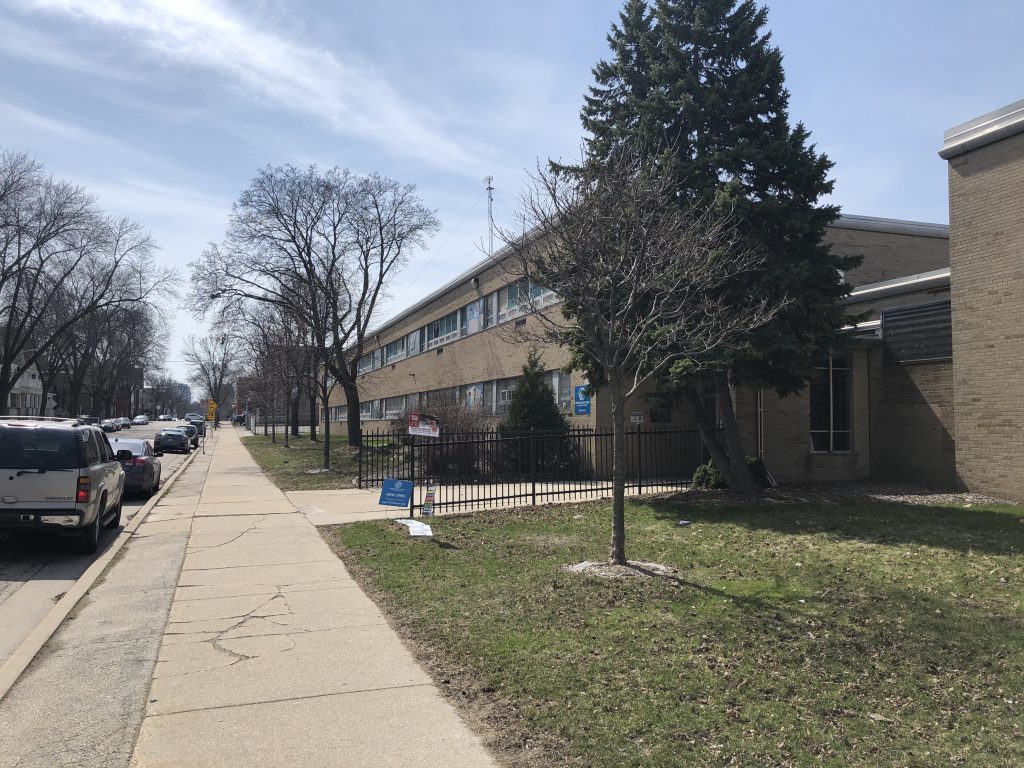MPS Struggles With Teacher Shortage
Could take until 2028 until all classrooms staffed with licensed teachers.
How bad is the teacher shortage at Milwaukee Public Schools?
At the June 22 Milwaukee school board meeting, board member Henry Leonard offered this quip: “Just this month alone, 90 people have either retired or left our district. If that pace keeps up, board members will be in classrooms.”
MPS finished the school year with over 300 positions not filled by teachers certified for their teaching assignments, as Urban Milwaukee has reported. The administration concedes it will take years to fill the vacancies. Its strategic plan outline states that “By 2028, MPS will have… sufficiently licensed staffing to fill all classrooms.”
Previously, Superintendent Keith Posley has outlined all the ways the district is recruiting teachers, including hiring some 140 international teachers. A report by MPS human resources states that it has reached out to potential teachers in Mexico, Spain and Puerto Rico.
At the June 22 meeting, Katrice Cotton, chief school administration officer, built upon the district’s efforts: “MPS has conducted an aggressive plan to recruit teachers and staff through in-person and online efforts and advertising that includes television, radio and social media campaigns – using local media outlets, geo-tracked tactics and ads on bus-boards, digital billboards, school-based events and district-wide events.” The district is also creating pathways for present MPS employees to advance such as preparing paraprofessionals to become classroom teachers, working with area colleges and universities.
Still the district projects a modest rate of likely success: filling 5% of the vacancies per year for the neediest schools.
In comments to Urban Milwaukee, Amy Mizialko, president of the Milwaukee Teachers’ Education Association (MTEA), said “the hiring process hasn’t been perfected.” Nevertheless, she added, “The superintendent and the chief of human resources take the issue of staffing very seriously,” and “MPS has shown, on paper, some success in the recruitment of international teachers.”
The teacher shortage is not felt by all schools. Statewide, urban and rural schools are hurt the most. Elite programs and higher income communities have all the teachers they need. Inequitable distribution exists even within MPS. Schools in poorer neighborhoods have teacher vacancy rates of 30%, 40%, or higher, as Urban Milwaukee has reported. Schools on the far South Side and specialty schools have few vacancies.
The National Education Association (NEA) noted the inequalities in a June 2020 document entitled “Teacher Quality and Equitable Distribution,” that discussed strategies including signing bonuses to teach in positions which are the hardest to fill. The MTEA is a NEA affiliate.
On May 26, 2022, the MPS board approved a recruitment incentive plan to address staffing inequities. An incoming teacher can receive a onetime bonus of $6,000 if that teacher agrees to teach in a needy position for three years. Teachers coming from out-of-state can receive a onetime housing allowance of $5,000. MPS employees are eligible for a bonus of several hundred dollars for referring new hires.
No listing of how many vacancies were filled using the incentive system is available. MPS is using the last of its federal pandemic funds, ESSER III (Elementary and Secondary School Emergency Relief Funds), to pay for incentives. The district has not offered a plan to continue incentives once funds run out.
Teacher unions have a long opposed salary differentials for teachers such as paying a science teacher a higher salary than an English teacher. Teacher shortages in one area allow unions to put pressure on districts to raise salaries for all teachers. However, signing bonuses are supported by unions — unfilled vacancies hurt all teachers.
Mizialko believes that the MPS decision to give all employees an 8% raise will help keep teachers in Milwaukee and may help recruit teachers from neighboring districts.
“In Racine they have been slow and negligent in coming to the [negotiating] table,”she noted. “Racine [teachers] invited MTEA to do a press conference with them, and we brought MPS hiring materials with us and set up a table. It would be an incredible loss for Racine to have teachers… travel the short distance from Racine to Milwaukee.” Since then, the Racine school board agreed to an 8% raise.
Raises of 8% or more are coming to Madison, Wauwatosa and other districts, which may impact MPS’s ability to compete for new and existing teachers. The new state budget appears to have done little to bridge the financial inequities between school districts. MPS still lacks the necessary funding to fill all vacancies.
But it is more than money that helps a school maintain its staff, says Mizialko. “How is the district guaranteeing that there is a highly skilled principal there who is an instructional leader, who has a great skill set in terms of shared leadership, a good work culture?” She believes the quality of leadership is uneven.
Filling vacancies in the neediest schools will be difficult. Attempts to increase the supply of teachers, whether through traditional or alternative programs, will take several years. In an era of enrollment declines, fewer students are attending colleges and fewer still are going into education.
One available pool of teachers is retired educators. One impediment is that retirees’ retirement benefits may be suspended during the time they are rehired. A bill to allow them to continue to draw a teaching salary at the same time as maintaining their retirement benefits was introduced in January. But some legislators bristled at the thought of teachers “double dipping” even though it would have little if any financial impact on the state. The legislation has not advanced.
Dan Rossmiller, executive director of Wisconsin Association of School Boards, says that many teachers operate under a misunderstanding. In fact, they could return to the classroom up to a year and still draw their pension so long as they did not exceed a certain number of hours and other conditions. Teachers should get legal advice before returning, he advises. Rossmiller also believes the COVID-19 pandemic hampered their return given their age and health concerns and the need to care for family members.
Would the MTEA support allowing retirees to return to the classroom without a financial penalty? “Absolutely,” says Mizialko.
If you think stories like this are important, become a member of Urban Milwaukee and help support real, independent journalism. Plus you get some cool added benefits.
K-12 Education
-
MPS Training in Science of Reading Going Poorly
 Nov 23rd, 2025 by Terry Falk
Nov 23rd, 2025 by Terry Falk
-
The Fear Factor at MPS
 Nov 11th, 2025 by Terry Falk
Nov 11th, 2025 by Terry Falk
-
MPS Reaching Out to Community
 Nov 2nd, 2025 by Terry Falk
Nov 2nd, 2025 by Terry Falk























Excellent article. This article did not mention the Scott Walker “reforms” which almost totally eliminated teacher’s bargaining rights to have a say in the curriculum issues and job protections. As is what is happening in the Waukesha School System, teachers who might challenge reactionary school board policies are quickly brought up on misconduct charges and threatened with termination. The article also did not mention teachers being threatened, harassed, and possibly sued by conservative activist parents over traditional aspects of curriculum. No wonder there is a teacher shortage.
MPS teachers union seriously needs to hire the strategic consultant that the MKE Police Union uses.
Whomever that person is (that devised & implemented the police unions’s strategy for the 2% Tax bill) should win a Gold Medal & Lifetime Achievement Award.
The new 2% sales tax deal seems like it was 99.9% written by the police/fire dept union. ….. Fascinating to see what they got from us taxpayers …. If you make it past 20 minutes of reading the bill, you’ll see new law requires taxpayers to:::: Protect & fully fund their pension (which is THE cause of the “fiscal Cliff”), mandate that taxpayer’s continue to pay the employee share of their pension contributions (while at same time makes it a crime to do the same for any other govt employee), mandate their pay/benefits cannot go down, mandate that 100’s more of them are hired, mandate that yet even more are paid as part time “school security guards”, mandate that taxpayers pay for their training (ie: junkets), etc.
90% of the revenue from the new 2% sales tax is required to pay for their generous pension, and 10% is required to pay for salaries of the current # police at current salary/benefits plus any additional costs for employing a few hundred more until we hit 1725 police, plus 200 something firemen/women, plus the x number of “law officers” to serve as “school security guards” (after losing the Collins lawsuit, MKE police officers need to find new method of getting paid OT so they can bulk up their pension payouts).
The overly generous provisions of MKE Police Pension caused 100% of the problem, yet they gave up nothing in this entire process, and in fact they enriched themselves for their entire lifetime!!
The genius idea IMO was to sprinkle in some scary words like “streetcar” and “diversity” at the top of the tax bill … Knowing that nobody would ever read to the bottom of the document, where the 90% & 10% mandates are buried. . … which worked as planned based on statement written by handful of city alderman/women.
…..”Pay No Attention To The Man Behind The Curtain”……
…. Obviously, the teachers need to hire away whoever the police dept used !!!
One available pool of teachers is retired educators. One impediment is that retirees’ retirement benefits may be suspended during the time they are rehired. A bill to allow them to continue to draw a teaching salary at the same time as maintaining their retirement benefits was introduced in January. But some legislators bristled at the thought of teachers “double dipping” even though it would have little if any financial impact on the state. The legislation has not advanced.
What is wrong with those in Madison? How could this legislation not be advanced?? We have retired teachers and with a little flexibility – could make a major difference! What if they were allowed to teach only three classes a day and simply paid for those three classes?
Is there anything more important than the education of children?
Why isn’t the paper demanding an answer from those that we vote for?